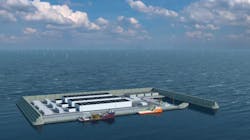Public consultation of Denmark's energy island in the North Sea kicks off
Offshore staff
COPENHAGEN, Denmark — The Danish Energy Agency invites citizens, companies, authorities and others with an interest in the future energy island in the North Sea to contribute with suggestions and ideas on topics that are to be elucidated in the environmental assessment of the plans for the energy island.
The consultation runs from Aug. 22 to Sept. 26, and in this connection the Danish Energy Agency will host a dialogue meeting on Sept. 6.
The establishment of a new energy island about 100 km off the west coast of Jutland will be one of the largest construction projects in Danish history, and the Danish Energy Agency, which is in charge of the development plan for the island, is similarly high.
Mogens Hagelskær, deputy director general of the Danish Energy Agency, who is responsible for the energy islands in Denmark, said, "With the Plan for Program Energiø North Sea, which is now to be environmentally assessed, the Danish Energy Agency has created an inclusive and future-proof plan with room for innovation both in relation to the flexible island concept and additional offshore wind farms, but also with the possibility of expanding and connecting the innovative technologies of the future.
"The environmental assessment process is an important step in the realization of energiø North Sea, which marks a new era for the production of energy from offshore wind on an unprecedented scale, which in turn will have a major impact on the green transition and the phasing out of fossil energy sources in both Denmark and Europe. So we are dealing with a ground-breaking construction project, where it is important to get input from as many people as possible. Therefore, we encourage everyone with interest to make suggestions on what should be taken into account in the environmental assessment of the Plan for Energy Island North Sea."
The energy island will ensure that in the coming years, Denmark can electrify more parts of society in a green way and contribute to ensuring that the power consumption of all Danish households and companies is covered by green power. The power from the energy islands must also be exported to neighboring countries, thus contributing to a greener Europe.
At the same time, Energiø The North Sea must be able to be connected to future technologies that, with green power from the offshore wind turbines, can, for example, produce and store green fuel for e.g. aircraft, ships and trucks (Power-to-X).
The energy island will contribute significantly to the green transition through electrification of sectors that are primarily driven by fossil energy, and it will contribute to achieving the government's goal of climate neutrality by 2050. The establishment of the energy island is also expected to entail significant job creation, including in Denmark.
08.22.2022



